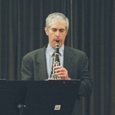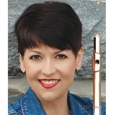Daniel Dorff was born in New Rochelle, New York in 1956. At the age of 18 he won first prize in the Aspen Music Festival’s annual composers’ competition for his Fantasy, Scherzo and Nocturne. He is a graduate of Cornell and the University of Pennsylvania where he studied with George Crumb, George Rochberg, Karel Husa, Henry Brant, Ralph Shapey, Elie Siegmeister, and Richard Wernick. His works have been performed by the Philadelphia Orchestra, Atlanta Opera, Baltimore Symphony, Pittsburgh Symphony, Louisville Orchestra, Indianapolis Symphony, Detroit Symphony, Aspen Music Festival, Spoleto Festival and Eastman Wind Ensemble. He has written more than 26 compositions featuring the flute and the piccolo.
.jpg) What led you to become a composer?
What led you to become a composer?
In my first week at Red Fox Music Camp, soon after discovering classical music in 10th grade, I heard Paul Creston’s Fantasy for Trombone and Orchestra, and I’ve never been the same since. I was so riveted and enthralled by music that sounded to my innocent ears as somewhere between Gershwin and Tchaikovsky, that there was no decision to be made – that was my life’s mission as of that moment. A week later I was exposed to The Rite of Spring at Tanglewood, and there was no turning back. My parents handled this wisely. They made sure I knew what I was getting into without romanticizing the career of a composer. They encouraged me to go to Aspen the next summer to be surrounded by more advanced composition students, and they trained me to make the important decisions in my life, armed with ample knowledge and research.
Were there musicians in your family?
There are excellent musicians in the far reaches of my family, and my parents listened to WQXR when I was growing up, but my only real exposure to playing music was in public school. By high school I couldn’t imagine doing anything else with my life. The head of my high school’s music department was a composer named Harold Gilmore. He wrote songs for Billie Holliday, studied composition with Nadia Boulanger, and was an arranger for the NBC Orchestra until hearing loss forced him to switch to teaching. Mr. Gilmore was invaluable in guiding us through discovering music, and he was very realistic about career prospects. There were several dedicated musicians in my graduating class; he urged all of us not to go into music professionally. A few years later I asked why, and he answered that the others took his advice, meaning they would have become discouraged before long as a musician’s world is a lot tougher than his warnings. I was too stubborn and determined to listen to him, which meant I had the conviction and drive to stick with it.
Tell us about your studies at Aspen.
When I was a novice at Aspen, I tried to write what was expected of composers – atonality, jumpy fragmentation, and sounds that had never been heard before, as long as it mimicked Carter or Boulez, and not Copland or Barber. I also played in a saxophone quartet that needed repertoire, so one weekend I wrote an 11-minute, 3-movement quartet for my ensemble, spontaneously using a language that just flowed out of me naturally, rather than “trying to be a composer.” I found my creative zone by creating repertoire that I’d want to play.
What was Elliott Carter’s response to hearing your music at Aspen?
He said my compositional language was obsolete in a post-World War II world. As a 17 year old, I replied, “I’m a comfortable middleclass Long Islander. Schubert suffered a terrible life. He should be the abstract expressionist while I write pretty melodies.” I have always thought that true self-expression should be self-expression rather than trendy.
Why did you choose to study at Cornell and the University of Pennsylvania rather than at a conservatory?
Those were the two hardest decisions of my life. In both cases I was accepted into Juilliard and wanted to study with Vincent Persichetti, who was famous for not having style prejudices in his teaching. Weighing against that was the opportunity to study every subject in the world at Cornell and have a B.A. just in case. This was followed by the opportunity to study at Penn with George Crumb, and George Rochberg who had just switched his creative language toward more traditional tonality. I often wonder about the road not taken. I learned a tremendous amount about music of all eras and how to think critically at those outstanding musicology schools. This choice in education left me without any college friends who became professional performers, while other composers were getting wonderful exposure and commissions from conservatory classmates going on to performing careers. In pragmatic terms that is a mistake I made twice. However the broad and deep education I got at Cornell and Penn prepared me both as a composer and as music editor to work knowledgeably on critical editions of music from Bach to Ives.
Describe your compositional style.
Much of my music has pentatonic motives built into themes, perhaps because that is often where my imagination starts. I am originally a saxophonist and I grew up on popular music in the 1960s, playing in stage bands in high school and college. I believe pentatonicism is natural in the human brain. Folk music from China, Africa, Eastern Europe, Western Europe, Native American, and African American spirituals is full of pentatonic melody in various ways. There has to be something primal in the human brain that causes so many unrelated cultures to spontaneously develop the same tuning system and melodic patterns. Why my music sounds French is a deeper question. My aesthetics are generally similar to French composers from Debussy through Poulenc, using a pretty surface and carefully crafted neo-traditionalism, but why is another question. Maybe this is because I began composing as a saxophonist memorizing Ibert and Bozza. I do have the same birthday as Ravel.
Most of my works are programmatic; even Sonata (Three Lakes) and Sonatine de Giverny have formal titles with references. My music often creates little worlds of escapism, and as long as the music works on its own, I like the added dimension of evoking a lake in Maine, or a woodland reverie. Some flutists imagine programs far beyond these titles, and that is gratifying because it means the music kindles their imagination.
When Jan Gippo commissioned a 10-minute piccolo piece, I had already planned a family trip to Giverny. Walking through Monet’s estate, it became clear that the busy flower garden, calm lily pond, and nearby town were analogous to a three-movement form, and the concept for Sonatine de Giverny was born. Likewise when the Monmouth Winds commissioned a wind quintet, I knew within a day that it would be a 5-movement suite called Cape May Breezes, with each movement capturing something about that quaint New Jersey beach town where I’ve vacationed many times. I’ve occasionally designed cover art with trees for music with no program at all, such as Nocturne Caprice with a cover of a full moon shining through a barren many-branched tree. That just seemed to match the music.
What do you mean when you tell performers to make it their own?
I tell performers to pretend I am no longer alive and am just a chamber music coach. Many performers (of all ages and levels) want to play exactly what the composer indicated, and sometimes that can be too literal and lifeless. “What the composer indicated” includes being expressive through color, dynamics, tempo, and phrasing, beyond what’s literally on the page. Sometimes I’ll say “play it like Syrinx” meaning that once you know a piece well, it’s necessary to explore where to add rubato or swells, and how much. Some pieces or movements should have a rigid pulse, and these can be brought to life with dynamics and phrasing. We interpolate in Fauré and Brahms, and there’s no rule that living composers don’t want the same musicality. Imagine if actors read theatrical monologues like a newscast. Playwrights offer the words and sometimes parenthetical instructions, and performers must breathe life into those words. Music has a very strong correlation. The Bach Partita or Syrinx shouldn’t sound like a midi file – flutists first learn to control what’s on the page, then bring it to life; that’s what I intend for my music. Bernstein and Karajan each recorded the Beethoven symphonies several times. They weren’t wrong the first time – they just found alternate interpretations that were equally compelling.
How did you end up working in the publishing world rather than becoming a teacher?
When I finished graduate work at Penn, I’d never been out of school and was weary of other composers (classmates as well as teachers) telling me what harmonic language was valid for my works, so I took a break from academia before looking for a teaching job. To pay the bills in my hiatus year, I did free-lance proofreading for Theodore Presser Company. That led to part-time work in the office. When their editor retired a few years later, I was offered his position. I was reluctant to make a commitment to a year-round office job and less composing time, but I love producing sheet music, working with the amazing panorama of Presser’s composers, and having a steady income.
Has editing other composers’ works influenced your writing style?
I try to learn from everyone, and naturally I digest every composition that I edit and proofread. However, composing is really about building a musical structure over time, not about choosing a style. It is very analogous to books and drama – language is just the vehicle for the real storyline, and a book isn’t good or bad based on the dialect or language of the characters, but how the story is built and unfolded. I always look to further my craft, so in learning from other composers’ music, the actual sound is generally not relevant.
* * *
Compositions
Compositions for Flute
9 Walks Down 7th Avenue for Flute & Piano
Andante Con Variazione for Flute & Clarinet
April Whirlwind for Flute & Piano
August Idyll for solo Flute
Cape May Breezes for Woodwind Quintet
Dances and Canons for Flute & Clarinet
Flash! for Piccolo & Piano (or Band or orchestra)
It Takes Four to Tango for Flute & Guitar
It Takes Four to Tango for Flute Quartet (3 C & Bass)
Nocturne Caprice for solo Flute
Perennials for Flute, Clarinet, and Piano
Serenade to Eve, After Rodin for Flute & Guitar
Sonata (Three Lakes) for Flute & Piano
Sonatine de Giverny for Piccolo & Piano
Three Little Waltzes for Flute & Clarinet
Three Romances for Flute & Clarinet
Through a Misty Arch… for C Flute Ensemble
Trees (After the Poem by Joyce Kilmer) for solo Flute with Narration
Tweet for solo Piccolo
Two Cats for Flute & Clarinet
Woodland Reverie for solo Flute
The Year of the Rabbit for Flute Quartet or Ensemble (3 C & Alto)
Xena and Zoe for Piccolo and Bass Clarinet (in progress)
Selected Arrangements
A Treasury of Bach Duets for Flute & Clarinet
A Treasury of Mozart Duets for Flute & Clarinet
A Treasury of Puccini Duets for Flute & Clarinet
Variations on “America” (Ives) for Flute & Piano
Wir Eilen (J.S. Bach) for Two Flutes & Piano






